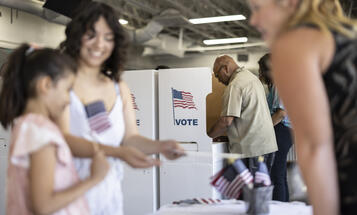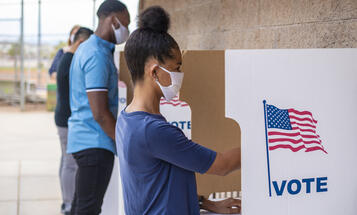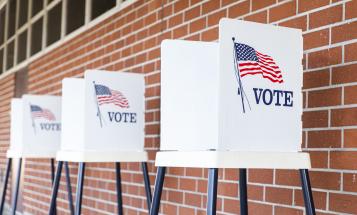
State Motor Vehicle Departments Don’t Measure Up on Voter Registration
20 years after the Motor Voter law went into effect, there are a few bright spots, but most state motor vehicle departments are falling down on the job.
The Pew Charitable Trusts released a report on Tuesday reviewing the effectiveness of implementation by state motor vehicle departments of the widely regarded 1993 “Motor Voter” law, known formally as the National Voter Registration Act (or NVRA). The report, titled “Measuring Motor Voter,” finds that, 20 years after Motor Voter went into effect, there are a few bright spots, but most state motor vehicle departments are falling down on the job.
When the Presidential Commission on Election Administration released its long-awaited report earlier on voting in America, among its findings were that the Motor Voter law is “the election statute most often ignored” by the states, and that “DMVs . . . are the weakest link in the system.” The Pew report largely confirms these conclusions. Pew finds that in many states, DMVs are actively shirking their obligations under the Motor Voter law, and are getting away with it due to lax enforcement. This compliance failure is abetted by poor or non-existent data collection by states, and by widespread misunderstanding on the part of the public about how Motor Voter works, which makes citizen oversight of the agencies ineffective.
Pew’s primary concern is with problems in the voter registration data collected (or not) by DMVs and state elections officials. The poor quality of the data, Pew says, makes it virtually impossible to evaluate the effectiveness of DMVs in registering voters. Many states don’t reliably collect data on voter registrations submitted by applicants for driver’s licenses. Some states collect the data, but acknowledge that it isn’t accurate. Others don’t collect it at all. A number of states overwrite the data whenever the voter submits a new update to her registration record, making it impossible to analyze DMV voter registration activities over time. In several cases, Pew reports, the data reported by a state’s DMV and by its election officials is in conflict.
As the Pew report recognizes, the unreliability and incommensurability of the available data make it virtually impossible to assess states’ performance in implementing Motor Voter on either an individual or a comparative basis. The report makes a number of recommendations on improving data collection and reporting by states, including 1) automating and centralizing DMV data collection; 2) improving coordination between DMVs and elections officials; 3) developing standards for data collection and reporting across states; and 4) improving training of DMV personnel on voter registration.
Although the overall sense coming out of the report is one of frustration, Pew does highlight a few success stories. Delaware has adopted a system of electronic signatures, allowing voters to register or update their registrations online when performing a driver’s license transaction. In Michigan, driver’s license and voter registration are administered by a single agency, and licensing and voter registration records are linked, ensuring that both are kept up to date. Pew commends North Carolina for its comprehensive and detailed data collection, if not for the effectiveness of its DMV in registering voters. And Pew praises New Mexico for a series of improvements in data collection as well as in the voter registration services offered by its DMV—improvements brought about as a result of litigation initiated by Demos and other voting rights organizations.
While the report does not offer bottom-line conclusions concerning state compliance with Motor Voter, the picture it paints is troubling and suggests that one of the signature pieces of voting rights legislation of the past two decades has yet to fulfill its promise. The spotlight Pew has aimed at this problem should lead states to examine their DMV voter registration procedures to ensure full compliance with the NVRA. It also suggests the need for a comprehensive review of DMV voter registration policies and practices in each state to determine what works best to maximize compliance with this important law. The report should also cause the U.S. Department of Justice, which has primary responsibility for enforcing the NVRA, to take notice and step up its investigation of states’ compliance with their voter registration responsibilities.
Efforts by groups such as Demos, Project Vote, the Lawyers’ Committee for Civil Rights Under Law, and other voting rights organizations over the past several years have helped turn around similar compliance problems at state public assistance agencies, which are also required to provide voter registration services under the NVRA. There remains a lot to do to ensure that the NVRA realizes its potential for making voter registration widely accessible to eligible voters.


